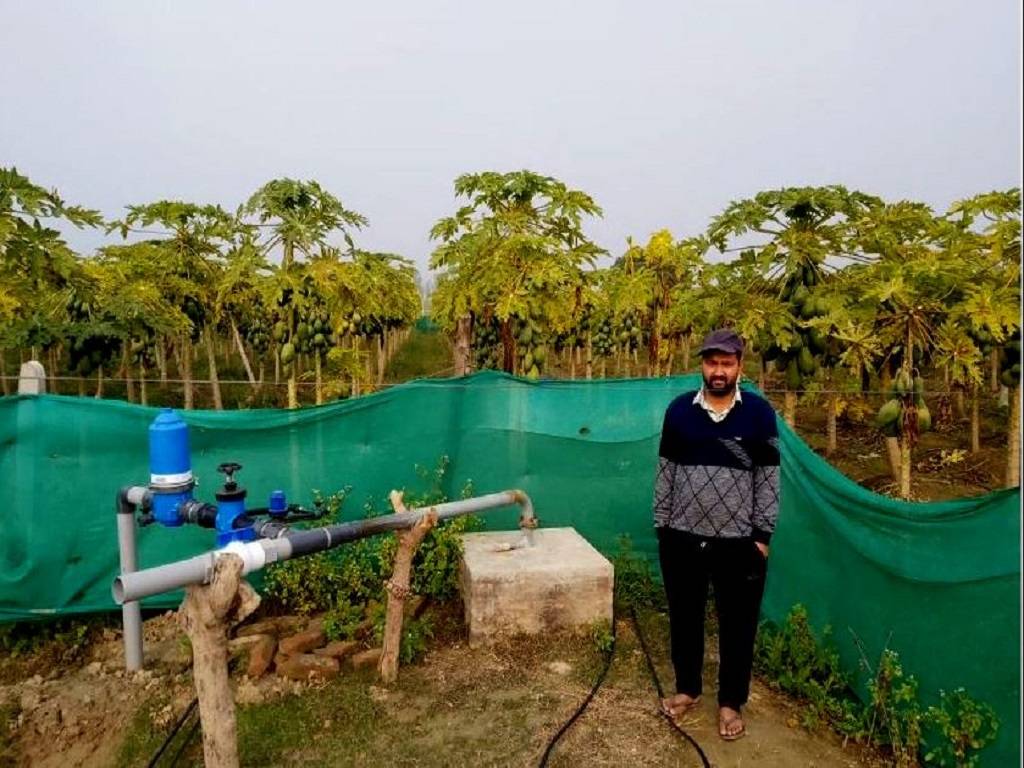
Amethi’s Someshwar Singh, who was working as an engineer in Noida at the time, was among the few who tried their hands at farming during the COVID-19-induced lockdown. He now has a four-acre papaya farm that generates around Rs.15 lakh per year.
He has been working as an executive engineer for an international technology business at the Noida branch since 2018. He makes more than Rs.1 lakh per month from his corporate job. "Before that, I worked for two to three technological businesses where I was subjected to a lot of work pressure," Someshwar added.
Someshwar hails from a small village called Madhupur Khadri in Uttar Pradesh's Amethi district. He completed his college education at Shri Shiv Pratap Inter College before enrolling in Ghazipur's Ideal Institute of Engineering for his electronic engineering degree.
"I come from a farming family. Despite clearing Class 12th, my father has been farming since he was a child. So, coming from such a low-income family, you have only one ambition: to work hard and get a better job. Fortunately, I was able to do so," Someshwar said.
The coronavirus lockdown, on the other hand, forced him to return to his roots. On March 17, 2020, he returned to his village and began working from home. “In my childhood, I used to spend my time on my father’s farm, so I know a little bit of farming,” he adds. So, during his free time, while working from home from his native place, he decided to give farming another try.
He realized papaya farming could be beneficial after conducting extensive research on which crop would be better to harvest. "In my region, only a few people grew papaya. As a result, there was little competition for sales or better costs. I did a lot of research by watching YouTube videos and reading online to learn better ways of papaya cultivation," Someshwar stated.
By March 2021, he had bought around 5,000 'Red Lady 786 Papaya Taiwan' seedlings and had planted them on four acres of farmland (out of a total of 8 acres). Someshwar describes his agricultural tactics as follows: "First, he lay down 75 tonnes of cow dung for greater soil fertility, and then he constructed a lot of beds on the farm surface. Then he planted the papaya saplings. The distance between the two beds was 6 feet and between the two plants was 8 feet.
"While irrigating, we should make sure that the beds are not wet or moisturized, or else it will impair the plant's growth which may harm it," he explained. That is why, with the assistance of district officials, I also installed drip irrigation at a 90% discount."
He said that the drip irrigation project costs Rs.3.30 without the subsidy.
"I use Neem oil instead of toxic pesticides, but occasionally I have to use less harmful pesticides called ImidaCloprid to safeguard the crop from viruses," Someshwar added. My crops are 70% organic in this regard. The pesticide I use has a residual duration of around 15 days, so by the time they reach the end client, they are no longer toxic.
His plants began producing papaya fruits after six months. "I harvest once a week, and I was able to sell about 20-25 quintals in one harvest. On average, I earn Rs.20 for 1kg of fruit."
"Sometimes I harvested fruits five times a month," he added. So, in six months, I was able to recoup my Rs.6 lakh investment for the plants, cow manure, and other expenses. It's been a year now and I managed to earn nearly thrice what I had invested.”
Someshwar's parents were scared and discouraged him from pursuing farming because he was investing lakhs of rupees in it. "Their concerns were not wrong. As a farmer, they have witnessed adversity in farming via their own experience as well as that of other farmers. But I went with my gut feeling and now my family is happy with my decision. Now, they don’t have any problem and are motivated to follow suit.”
When discussing the differences between corporate life and farming, Someshwar said that in the business sector, one must be accessible for around 9 hours at the office. "Of course, there is the pressure when you work 9 hours every day. You don't have much time to spend with family and friends. Farming, on the other hand, provides you with complete freedom. I usually just spend 3-4 hours a day in the field. I have 5-10 contract laborers who occasionally do some work on the farm. This reduces my burden further,” he said.
He further adds that living with family and staying at his native place helped him better his mental health.
Those interested in farming should approach it from a different perspective, he advises. "Farmers should embrace organic farming as much as possible since we can't offer toxic food to people as farmers. Farmers should also avoid cultivating what other farmers are growing. Rather, various farmers should plant diverse crops which lessens competition while simultaneously providing you with higher rates.
Furthermore, farmers should educate themselves. The more you learn, the better you may progress in farming and so earn," he claimed, adding, "Don't be scared to take a risk in farming."
With no intentions to quit his corporate job and his father assisting him on the farm, he added, "I will try to spend as much time as possible on the farm. I will also experiment with different crops as I have a huge farm.”











